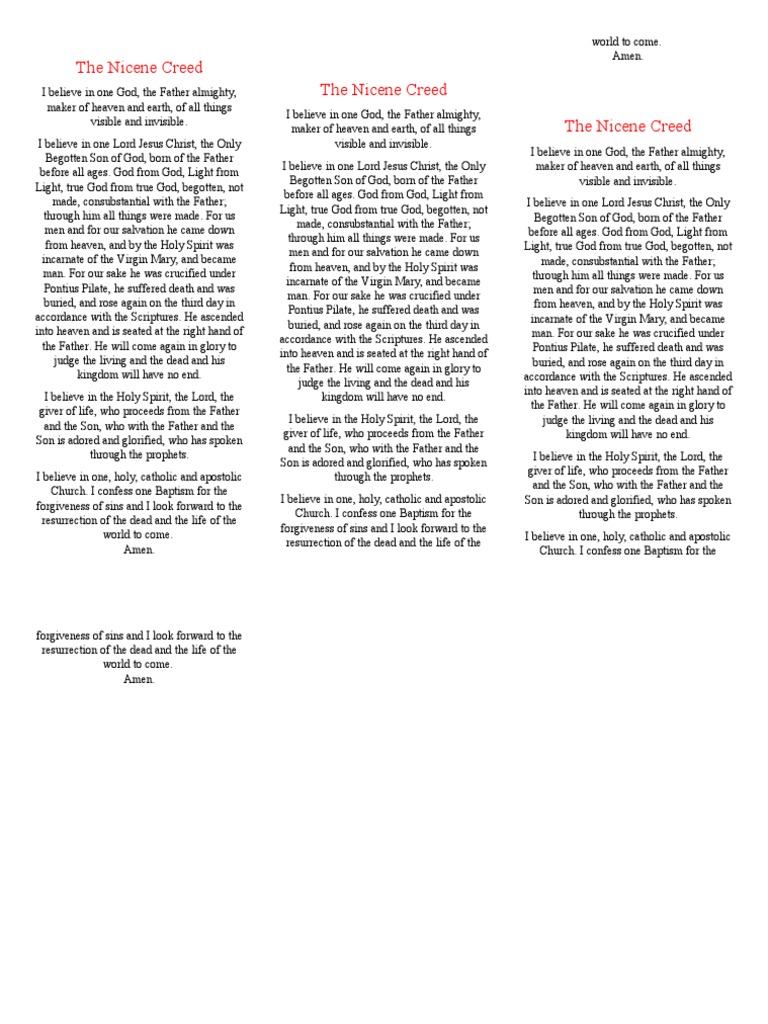The Nicene Creed stands as a monumental testament to Christian faith, a declaration that continues to unify believers across diverse traditions and cultures. In an ever-changing world, where interpretations of faith can vary widely, one might ask: Why does such a historical document still matter today? Can a creed penned in the fourth century truly resonate with modern believers? These questions not only deserve exploration but challenge us to delve deeper into the theological and historical significance of this foundational statement.
To appreciate the Nicene Creed, it is essential to contextualize its origins within the early Christian church. The Creed was formulated during the First Council of Nicaea in 325 AD, convened by Emperor Constantine. This pivotal assembly aimed to address pressing theological disputes, particularly those surrounding the nature of Christ and His relationship to God the Father. At the forefront was the Arian controversy, which posited that Christ was a created being, distinct and subordinate to God. This moniker—Arianism—sparked fierce disagreements among early Christians, leading to the council’s intervention.
The Nicene Creed emerged from this tumultuous backdrop as a clarion call for orthodoxy, seeking to establish a unified belief system. Its opening phrases affirm critical tenets: “We believe in one God, the Father Almighty, Maker of heaven and earth, and of all things visible and invisible.” This succinct assertion underscores the monotheistic foundation of Christianity, emphasizing the primacy of God as the creator of all existence. In a world rife with polytheism, the creed’s clarity on God’s singularity was revolutionary.
Furthermore, the articulation of Christ’s divinity is essential. The Creed continues, proclaiming Jesus as “the only-begotten Son of God, begotten of the Father before all worlds; Light of Light; very God of very God.” Each phrase meticulously delineates the nature of Christ, countering the Arian perspective effectively. The term “begotten” is especially significant as it connotes a unique and eternal relationship between the Father and the Son, distinguishing Christ from all created beings. This bold theological assertion has profound implications on how believers view not just Christ, but the entirety of divine revelation.
As one examines the subsequent lines, the Nicene Creed navigates complex theological terrain, addressing the Holy Spirit’s role in the Trinity. It states, “And we believe in the Holy Spirit, the Lord and Giver of Life, who proceeds from the Father.” This inclusion signifies an early recognition of the Trinity’s inter-relational dynamics. The Holy Spirit’s divine nature is not merely an afterthought but a crucial aspect of God’s redemptive work in the world. The acknowledgment of the Spirit as the “Giver of Life” encapsulates His vital role in the believer’s spiritual journey.
Over centuries, the Nicene Creed has transcended its initial purpose, evolving into a hallmark of liturgical worship. Many Christian denominations recite it during worship services, reinforcing communal identity and doctrinal integrity. This practice invites reflection on the significance of faith as a shared experience. How does collective affirmation of core beliefs impact the individual believer? Perhaps it solidifies the understanding that one’s faith is not just a personal journey but a collective legacy passed through generations.
Yet, while the Creed provides a firm foundation, it also presents challenges to contemporary believers. In a pluralistic society, the Nicene Creed’s exclusive claims may appear increasingly at odds with an ethos of inclusivity. One might ponder: Does adherence to this ancient text hinder engagement with a diverse world? This dilemma invites Christians to ponder the balance between fidelity to doctrinal truth and a compassionate outreach to those with differing beliefs. The Creed demands an articulation of faith that is loving yet firm, exclusive yet welcoming.
In light of modern challenges, the Nicene Creed serves not only as an affirmation of belief but as a source of spiritual nourishment. In times of doubt or confusion, reflecting on its declarations can provide clarity and reaffirm faith. Its teachings illuminate the characteristics of God, the invitation to relationship with Christ, and the empowerment of the Holy Spirit. Each line resonates with theological depth, offering a rich soil for spiritual growth.
The creed’s historicity also invites us to consider the broader narrative of salvation history. The bold assertions made in the Nicene Creed encapsulate the Christian understanding of God’s work through past, present, and future. It invites believers to see themselves as part of a grand story, woven into the tapestry of God’s redemptive plan. The echoes of early debates surrounding the nature of Christ and His relationship to humanity reverberate through time, inviting each generation to wrestle with its implications.
Furthermore, the Nicene Creed has had a lasting impact on Christian ecumenism. In an age where denominational differences often divide, this historic document represents a point of convergence for varying traditions. It illustrates that despite differences in interpretation and practice, the core tenets of faith remain a shared heritage among Christians. This realization fosters deeper dialogue and understanding among believers, encouraging unity in diversity.
In conclusion, the Nicene Creed is fundamentally more than a mere historical document; it is a living text that continues to inspire, challenge, and unite believers. As individuals wrestle with its declarations within the context of modernity, they are invited into a deeper understanding of faith. Thus, let us embrace the richness of this foundational declaration and allow it to inform our lives, nurturing our relationship with God and strengthening the bonds we share within the global community of faith.



